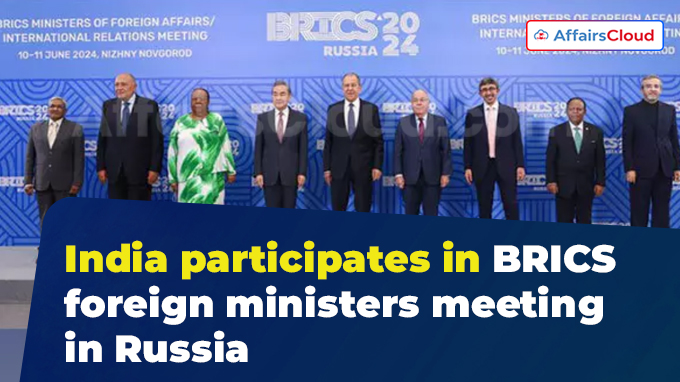 On 10th June 2024, India participated in the BRICS (Brazil, Russia, India, China and South Africa) Foreign Ministers meeting hosted by Russia, the current chair of BRICS, in Nizhny Novgorod, Russia. The meeting was chaired by Sergey Lavrov, Foreign Minister, Russia.
On 10th June 2024, India participated in the BRICS (Brazil, Russia, India, China and South Africa) Foreign Ministers meeting hosted by Russia, the current chair of BRICS, in Nizhny Novgorod, Russia. The meeting was chaired by Sergey Lavrov, Foreign Minister, Russia.
- The Indian delegation at the BRICS Foreign Ministers meeting was led by Dammu Ravi, Secretary (Economic Relations), Ministry of External Affairs (MEA).
- This also mark’s India’s first Foreign policy assignment under the historic 3rd consecutive term of Prime Minister (PM) Narendra Modi.
Points to Note:
i.This is the 1st foreign ministers meeting since the expansion of BRICS in 2023.
ii.During the 15th BRICS Summit held in 2023, Argentina, Egypt, Ethiopia, Iran, Saudi Arabia and the United Arab Emirates(UAE) were invited to become members of BRICS.
- The 5 countries officially became the new full member of BRICS bloc on 1st January 2024.
- Currently, BRICS bloc has 10 member countries.
iii.Russia took over the chairmanship of 2024 BRICS on 1st January 2024.
Key Participants:
Key participants at the meeting were: Naledi Pandor, Minister of International Relations and Cooperation, South Africa, Mauro Vieira, Minister of Foreign Affairs, Brazil, Abdullah bin Zayed Al Nahyan, Minister of Foreign Affairs, the United Arab Emirates (UAE), Wang Yi, Foreign Minister, China, Sameh Shokri, Foreign Minister, Egypt, among others.
Key Highlights:
BRICS Foreign Ministers released a joint statement which covered the vast range of global issues addressed during the meeting:
i.The Ministers emphasized their commitment towards multilateralism and adherence to international law.
- The member countries reaffirmed their support for comprehensive United Nations (UN) reform particularly in UN Security Council (UNSC).
ii.The Ministers recognised the pivotal role played by G-20 in international economic cooperation and welcomed the inclusion of African Union (AU) as G-20 member during the G-20 summit held in New Delhi, Delhi in 2023.
iii.The BRICS foreign ministers unanimously raised their concerns over ongoing global conflicts like: Russia-Ukraine War and Israel-Gaza war.
- The ministers gave call for the implementation of UNSC resolution 2728 for a immediate durable ceasefire and supported for Palestine’s full UN membership and a two-state solution based on international law.
iv.The ministers emphasized the importance on implementation of the UN Framework Convention on Climate Change (UNFCCC) and the 2015 Paris Agreement.
v.The BRICS foreign ministers emphasized the need for comprehensive reform of the global financial architecture.
- They underscored the paragraph 45 of the Johannesburg II Declaration which tasked the Finance Ministers and Central Bank Governors of the BRICS countries to address the issue of local currencies, payment instruments etc.
vi.The Ministers supported a robust Global Financial Safety Net with a strong quota-based and adequately resourced International Monetary Fund (IMF).
vii.BRICS member countries in reference to the Sharm E-Sheikh Action Plan of the COP27, hosted by Egypt in 2022, emphasized the necessary reforms in policies and practices of Multilateral Development Banks (MDBs) to help the developing countries to meet their financial needs for development and enhancing their climate action.
viii.The member countries expressed their support to transform the New Development Bank (NDB) into a new type of MDB, by expanding the NDB membership as per the NDB approved policies.
About BRICS:
i.BRICS was formed in September 2006 and it originally has 4 emerging economies as its member: Brazil, Russia, India and China (BRIC).
ii.BRIC group was renamed as BRICS after South Africa was accepted as a full member of BRIC in 2010
iii.At present, the BRICS represents 41% of the global population, 24% of the global Gross Domestic (GDP) and 16% of the global trade.




